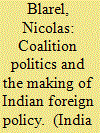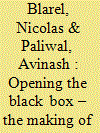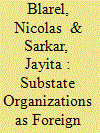|
|
|
Sort Order |
|
|
|
Items / Page
|
|
|
|
|
|
|
| Srl | Item |
| 1 |
ID:
170901


|
|
|
|
|
| Summary/Abstract |
Do Indian regional parties influence foreign policy and under which conditions? Some foreign policy studies have shown that certain coalition-building configurations have facilitated the inclusion of the concerns of small parties in the foreign policy debate. Other works have looked at the role of decentralization and federal power-arrangement in providing more control to political sub-units over the external affairs of a state. Those separate scholarships provide interesting insights to account for the multi-level nature of coalition-building in a federal and pluralistic polity like India. Bridging these two literatures, I argue that the interdependence of regional and national coalition building processes (visible in federal settings) create locked-in alliances between national parties and regional parties which affect foreign policymaking. In these contexts, India’s national parties have to, under certain conditions, take into account the preferences of regional parties when designing foreign policies. This article looks at the hypothesized causal mechanisms and expectations through two illustrative case studies of India’s foreign policy.
|
|
|
|
|
|
|
|
|
|
|
|
|
|
|
|
| 2 |
ID:
140490


|
|
|
|
|
| Edition |
1st ed.
|
| Publication |
New Delhi, Oxford University Press, 2015.
|
| Description |
xv, 411p.: table, figures, abbre.hbk
|
| Standard Number |
9780199450626
|
|
|
|
|
|
|
|
|
|
|
|
Copies: C:1/I:0,R:0,Q:0
Circulation
| Accession# | Call# | Current Location | Status | Policy | Location |
| 058297 | 327.5405694/BLA 058297 | Main | On Shelf | General | |
|
|
|
|
| 3 |
ID:
170893


|
|
|
|
|
| Summary/Abstract |
Most studies looking at India’s external policies continue to “black-box” the actual process of how Indian foreign policy is made. More specifically, most studies generally overlook how India’s complex domestic polity and bureaucratic apparatus shape India’s foreign policy outlook. Unlike works on India’s security policy which have built from and contributed to broader academic debates, studies on India’s foreign policy have failed to directly engage with concepts and theories developed by the sub-discipline of Foreign Policy Analysis (FPA). Why have these concepts and approaches not been consistently applied to the Indian context? There are various reasons for this, ranging from these disciplines’ excessive reliance on Western case studies, or the lack of interest in mainstream International Relations scholarship by South Asianists (in contrast to disciplines such as economics, political theory, and developmental studies, all of which have benefited from the Indian experience). This special issue is a step towards bridging this gap and to encourage a greater dialogue between FPA and the systematic study of Indian foreign policy. Through the careful analysis of specific case studies, the different papers offer a conceptually grounded and empirically innovative reading of India’s foreign policy across time, space, and themes.
|
|
|
|
|
|
|
|
|
|
|
|
|
|
|
|
| 4 |
ID:
167882


|
|
|
|
|
| Summary/Abstract |
The extant scholarship in international relations does not completely account for the role of sub-state organizations (SSOs) in foreign policymaking of states. Yet, international cooperation, especially, in specialized areas like defense, space and nuclear technologies that are intrinsically complex frequently witness extensive involvement of SSOs. In other words, SSOs often act as foreign policy agents driving the international partnerships. Why does this happen, and what are its causal mechanisms? In this study, we conduct a plausibility probe on the role of SSOs through examining India's partnerships with France and Israel in the specialized domains of nuclear, space and defense technologies, and find that the foreign policy executives (FPEs) within the governments frequently defer to relevant SSOs when specialized knowledge and expertise are required, thereby, conferring foreign policy agency to the SSOs. We also find that the SSOs select their international partners based on their goals of efficiency, common institutional designs and organizational cultures. Our conclusions lead us to draw scholarly attention to this largely ignored yet significant actor in foreign policy decision-making.
|
|
|
|
|
|
|
|
|
|
|
|
|
|
|
|
|
|
|
|
|